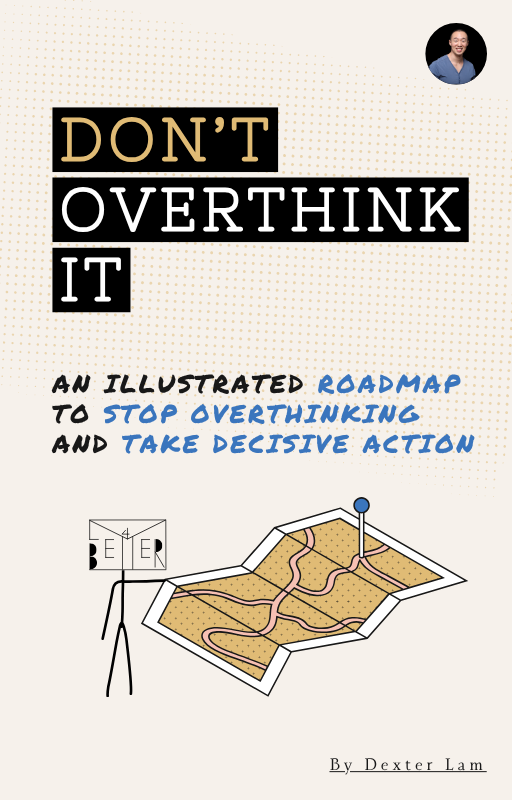Write your awesome label here.
Full Transcript of Dopamine, Serotonin, Oxytocin, Endorphins: Your Brain’s Secret Happiness Formula
[00:00] Intro - Why Positive Thinking Isn’t Enough
You’ve probably heard people say “just think positive” when you’re feeling down. But here’s the problem, positivity alone won’t be as effective if your brain chemistry is off balance. And that’s why understanding the four key chemicals in your brain can be the difference between you feeling groggy and unmotivated or energized, happy, and focused.
[00:23] What Chemicals Do In Your Brain (Analogy)
Just imagine your brain as a giant water park filled with water slides. The slides represent the pathways in your brain, where the goal is to move smoothly from one thought, feeling, or action to the next. But without water, the slides can feel sticky, slow, and uncomfortable. This is exactly where dopamine, serotonin, oxytocin, and endorphins come into the picture: they’re essentially the water that makes everything flow smoothly.
[00:51] Overview
So if you’ve ever wondered why you sometimes feel motivated and other times feel stuck in a fog, or sometimes feel deeply connected with people and other times feel lonely, stay with me until the end of this episode. Because by the time we’re done, not only will you learn what these brain chemicals do, you’ll also be able to spot signs when you’re running low, and how you can boost the function of these chemicals to increase your overall mood, motivation, and energy.
Let’s get into it.
[01:25] Dopamine Explained
First on the list is Dopamine. Dopamine is often called the “reward chemical” because it fuels motivation, drive, and that sense of accomplishment. Every time you check off a task on your to-do list or celebrate a small win, that little burst of satisfaction that you feel is dopamine.
[01:45] What Happens When You Run Low On Dopamine
But what happens when you’re running low on dopamine? Low dopamine can look like procrastination, low energy, or even depression. And here’s the catch: things like endless scrolling or junk food give you short-term dopamine hits that leave you more depleted later.
[02:04] Common Misconceptions About Dopamine
Here’s a common misconception about dopamine that I want to point out. You don’t have a finite tank of dopamine per day that runs out like gas in a car. Dopamine is constantly being produced, released, and recycled in your brain. So technically, your brain doesn’t just “use it all up” in a single day.
[02:24] Defining Cheap Dopamine
This is where that idea of “cheap dopamine” comes from: When you doom scroll social media or chase constant micro-rewards like social media likes, notifications, eat junk food, or indulge in quick hits of entertainment, your brain gets frequent little spikes of dopamine. The problem is, those spikes are shallow and repetitive. Over time, your brain’s reward system becomes desensitized. It starts to require more stimulation to feel the same reward, and things that actually matter, like working out, reading, or finishing a project feel less rewarding by comparison. So it’s not that you run out of dopamine, it’s that your brain’s baseline dopamine sensitivity gets lowered, which makes it harder to focus or feel motivated for deeper, more meaningful tasks.
You can think of it like your taste buds. If you eat candy all day, fruit won’t taste as sweet anymore, even though nothing has changed about the fruit. Doom scrolling is like candy for your brain’s reward system, it basically dulls your ability to enjoy the “healthier” sources of dopamine.
[03:36] Ways to Naturally Boost Dopamine
If you want to naturally boost your dopamine levels, you can celebrate small wins, exercise, listen to music, and set achievable goals. In terms of supplements, some people take B vitamins like B5 and B6, omega-3 oils, or minerals like magnesium and zinc to support dopamine production. So if you’ve been feeling unmotivated, maybe it’s not that you’re lazy, maybe your dopamine levels just need some care.
[04:05] Serotonin Explained
Next up is Serotonin. Serotonin is often called the “mood stabilizer.” It’s the chemical that helps regulate mood, sleep, appetite, and even digestion. When serotonin levels are balanced, you feel calm, stable, and more resilient to stress.
[04:22] Signs of Low Serotonin
But when serotonin is low, life feels heavier. You might struggle with anxiety, irritability, sleep issues, or potentially even depression. On a physical level, low serotonin can show up as cravings, digestive issues, or trouble winding down at night.
[04:38] Misconceptions About Serotonin
Here’s a common misconception about serotonin: serotonin doesn’t just live in your brain. About 90 percent of it is actually made in your gut. That means what you eat, your gut health, and even inflammation play a huge role in how much serotonin you have available. So if you’ve ever felt your mood dip after weeks of poor eating, lack of sleep, or chronic stress, that’s not “all in your head,” your brain chemistry is directly affecting your emotional and physical state.
[05:11] How to Increase Your Serotonin
If you want to increase your serotonin naturally, you can spend time in the sun, exercise regularly, eat foods like turkey, eggs, and nuts, and practice gratitude or mindfulness. In terms of supplements, people often take omega-3s or probiotics. And if you’re someone who doesn’t like spending time in the sun, vitamin D is a good alternative way to support healthy serotonin production.
[05:38] Weekly Mindset Newsletter
By the way, if you're looking to stop overthinking, improve your decision making, or make a mindset shift, I come out with a weekly mindset newsletter. It's absolutely free, and I share personal stories that I don't post anywhere else, and it's a great way to connect, so I'll drop a link in the description below.
Enjoying the Read?
Weekly Mindset Newsletter
Get personal stories, decision-making strategies, and mental frameworks to help you stop overthinking, build self awareness, and live with more clarity.
Thank you!
[05:56] Oxytocin Explained
Now let’s talk about Oxytocin. Oxytocin is often called the “love hormone” or the “bonding chemical.” Oxytocin is released during moments of trust, intimacy, and connection. It’s what helps you feel safe, bonded, and emotionally closer to others.
[06:13] What Happens When You Run Low On Oxytocin
When oxytocin is low, people can feel lonely, disconnected, or overly stressed. It can also make it harder to trust others or form deep relationships, which unironically can lead to reinforcing feelings of isolation.
[06:26] What People Don’t Realize About Oxytocin
Here’s something most people don’t realize about Oxytocin. Oxytocin isn’t just about romance or physical touch. Yes, it spikes during hugs, holding hands, or intimacy, but it’s also released when you play with a pet, share a laugh with friends, or even do an act of kindness for someone. Oxytocin is about human connection, in all its forms.
You can think of oxytocin as the social glue of life. It’s what binds people together, making communities and relationships stronger. Without enough of it, life can feel empty and isolating, like a puzzle with missing pieces.
You can think of oxytocin as the social glue of life. It’s what binds people together, making communities and relationships stronger. Without enough of it, life can feel empty and isolating, like a puzzle with missing pieces.
[07:09] How to Increase Oxytocin Naturally
If you want to increase oxytocin naturally, the way you can do this is by giving and receiving hugs, practicing eye contact, spending quality time with loved ones, or even helping others. Listening to music, meditation, or playing with animals can also boost your oxytocin levels. Some people also support oxytocin release with supplements like magnesium or vitamin C, which play a role in regulating your hormones.
[07:37] Endorphins Explained
And finally, we have Endorphins. Endorphins are your body’s natural painkillers and stress relievers. They’re released in response to stress, exercise, and even laughter. You know that feeling you get when you finish a solid workout? Where you get this euphoric feeling, where you’re calm, relaxed, and just lighter as a person. That’s your endorphins flowing.
[08:03] Signs of Low Endorphins
Now when endorphins are low, you may feel more sensitive to pain, emotionally drained, or stuck in stress. I’ve definitely noticed the difference in my mental and physical state on the days I don’t exercise. People often describe it as this dull and uninspired feeling, where the regular things you do on a daily basis just feel less enjoyable.
[08:25] A Common Misconception About Endorphins
A common misconception about endorphins is that they are only tied to intense exercise, like running a marathon. But the truth is, endorphins can be triggered by small, simple actions too, like listening to music, laughing with friends, or even eating spicy food. You don’t necessarily need extreme effort to release them.
You can think of endorphins as your body’s natural morphine. They don’t remove the source of pain or stress, but they help cushion the blow so life feels more manageable and sometimes even enjoyable during times of difficulty.
[09:03] Simple Ways to Boost Endorphins
Some simple ways you can boost endorphins include exercising, dancing, laughing, meditating, or listening to uplifting music. Even small rituals like taking a hot bath or practicing deep breathing can help. For me I love to go for walks just to get my heart rate up and get a light sweat that leaves me feeling more calm and collected. On the supplement side, dark chocolate, omega-3s, and ginseng are often linked to supporting endorphin release.
[09:35] Conclusion - Your Mental & Physical Health Are Not Separate
Here’s what I’ve learned. Your mental and physical health are not separate. They are directly tied together through your brain chemistry. When your dopamine, serotonin, oxytocin, and endorphins are balanced, life feels lighter, more energizing, and more connected. When they’re depleted, even simple things can feel more overwhelming.
So the next time you’re feeling unmotivated, disconnected, or stuck in a state of low energy, maybe it’s time to start looking at your chemistry. Because you can rewire your brain, not just through mindset shifts, but through the daily choices you make that will fuel these four happiness chemicals.
[10:16] My Question to You
So let me ask you this, which of these brain chemicals do you feel like you need to boost the most right now? Let me know in the comments section below.
[10:26] Outro - Let’s Grow Together!
My name is Dexter. I'm a mindset coach and I talk about self-awareness, decision making, as well as living a purpose driven life. And if you like this content, please don't forget to subscribe and also share this information with someone else who could also benefit from this brain information. And I hope you have a wonderful day. Bye bye.


